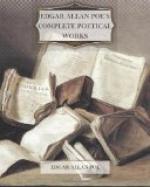Thou askest me if I could speak of love,
Knowing what I know, and seeing what I have seen
Thou askest me that—and thus I answer thee—
Thus on my bended knee I answer thee. (kneeling.)
Sweet Lalage, I love thee—love thee—love thee;
Thro’ good and ill—thro’ weal and woe, I love thee.
Not mother, with her first-born on her knee,
Thrills with intenser love than I for thee.
Not on God’s altar, in any time or clime,
Burned there a holier fire than burneth now
Within my spirit for thee. And do I love?
(arising.)
Even for thy woes I love thee—even for thy woes—
Thy beauty and thy woes.
Lal. Alas, proud Earl,
Thou
dost forget thyself, remembering me!
How,
in thy father’s halls, among the maidens
Pure
and reproachless of thy princely line,
Could
the dishonored Lalage abide?
Thy
wife, and with a tainted memory—
My
seared and blighted name, how would it tally
With
the ancestral honors of thy house,
And
with thy glory?
Pol. Speak not to me of glory!
I
hate—I loathe the name; I do abhor
The
unsatisfactory and ideal thing.
Art
thou not Lalage, and I Politian?
Do
I not love—art thou not beautiful—
What
need we more? Ha! glory! now speak not of it:
By
all I hold most sacred and most solemn—
By
all my wishes now—my fears hereafter—
By
all I scorn on earth and hope in heaven—
There
is no deed I would more glory in,
Than
in thy cause to scoff at this same glory
And
trample it under foot. What matters it—
What
matters it, my fairest, and my best,
That
we go down unhonored and forgotten
Into
the dust—so we descend together?
Descend
together—and then—and then perchance—
Lal. Why dost thou pause, Politian?
Pol. And then perchance
Arise
together, Lalage, and roam
The
starry and quiet dwellings of the blest,
And
still—
Lal. Why dost thou pause, Politian?
Pol. And still together—together.




